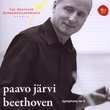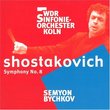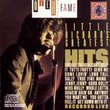| All Artists: WDR Sinfonie-Orchester Köln Title: Dmitri Shostakovich: Symphony No.7 ''Leningrad'' Members Wishing: 0 Total Copies: 0 Label: Avie Original Release Date: 3/22/2004 Release Date: 3/22/2004 Album Type: Import Genre: Classical Styles: Historical Periods, Modern, 20th, & 21st Century, Symphonies Number of Discs: 1 SwapaCD Credits: 1 UPC: 822252002027 |
Search - WDR Sinfonie-Orchester Köln :: Dmitri Shostakovich: Symphony No.7 ''Leningrad''
 | WDR Sinfonie-Orchester Köln Dmitri Shostakovich: Symphony No.7 ''Leningrad'' Genre: Classical |
Larger Image |
CD DetailsSimilar CDsSimilarly Requested CDs
|
CD ReviewsRestoring The Dignity to Shostakovich's Symphony No. 7 Grady Harp | Los Angeles, CA United States | 03/16/2008 (5 out of 5 stars) "Shostakovich has retained his stature as an important 20th Century composer despite his occasional detractors who find his music too uneven to qualify him among the 'Greats'. One of the most often referenced examples of his less successful works is his Leningrad Symphony (No. 7 in C Major), written in 1941 while Leningrad was under Nazi siege for 900 days. When Shostakovich wrote this lengthy work, it was an immediate success, not only in Russia, where is served as a stimulus for survival at all costs, but also outside of Russia, where it generated sympathy for the courageous Russians struggling against totalitarianism. With time the work was gradually dismissed as kitschy and one bruised by spotty moments of fine writing alongside less inspired measures. Under the right baton this epic score can be restored to its original intent - a reaction to invasion and a hope for survival. Semyon Bychkov is one of those conductors who is able to keep the work cohesive by playing it 'straight'. Without bending tempi merely for effect, Bychkov allows the work to speak with its own inherently strong passages. The first movement, marked Allegretto, is the 'invasion' theme, a theme that begins softly and slowly, steadily advancing as the Nazi march approaches the city. Shostakovich said 'I was thinking of other enemies of humanity when I composed the theme' and listening to the work as conducted by Bychkov focuses on this more generalized meaning. The impact is terrifying. The inner two movements are less programatic: the 'scherzo-like' Moderato has superb writing for solo instruments and the Adagio becomes almost funereal in conveying the tragedies of the purges. The final movement, Allegro non troppo, gathers strength from the threats posed by the first movement and ends in a magnificent brass highlighted banner of defiance against the threats of the first movements 'invasion'. This recording reveals Bychkov's strengths as one of the finer conductors of the Russian school. Yet fine as this recording is (the orchestra is not consistent or particularly burnished in tone), the recording was released in 2004. Hearing Bychkov conduct the Los Angeles Philharmonic in 2008 in the Disney Hall acoustics proves that he continues to grow into this too often maligned work. If any conductor can raise the critics' opinion of this symphony, then Bychkov certainly is toward the top of that list of proponents. This is a recording that deserves a place in the best of music libraries. Grady Harp, March 08" Bychkov is back in form as a top Shostakovich conductor Santa Fe Listener | Santa Fe, NM USA | 09/19/2007 (5 out of 5 stars) "When Semyon Bychkov was young and The Next Big Thing, having won the patronage of no less than von Karajan, he released a number of Shostakovich symphonies on Philips that showed an immense gift. He's wandered in the wildnerness since then (to Buggalo and Cologne), but here he's back with more Shostakovich, and the gift remains intact. The "Leningrad" Sym. 7 is gargantuan and wildly uneven in quality. I've said enough about its semi-junkiness in other reviews. The work needs all the adrenaline and power that a conductor can give it. Bychkov joins Temrkanov, Gergiev, and Jansons (live with the Concedrtgebouw on the orchestra's house label, ot his studio verison for EMI) in giving the classic versions a run for their money.
The WDR orchestra doesn't sound particularly Russian or especially virtuosic, but they are committed to Bychkov's robust, thrilling, often headlong approach, which is totally devoid of fussiness. Avie's sonics are first rate, which also helps. The notorious march of invading Nazis in the first movement proceeds without apology to a reckless speedup 15 minutes in. The finale is also propulsive, all the better for music that lacks intrinsic quality and depth. Even the third movement Requiem, as the composer dubbed it, feels energized at Bychkov's alert tempo. In all, I don't prefer this new CD over Bernstein on Sony or harder-to-find versions from Mravinsky and Kondrashin, yet it more than holds its own." |


![Shostakovich: Symphony No. 10; Glanert: Theatrum bestiarum [Hybrid SACD]](https://nationalbookswap.com/cd//m/74/2974/6162974.jpg)





